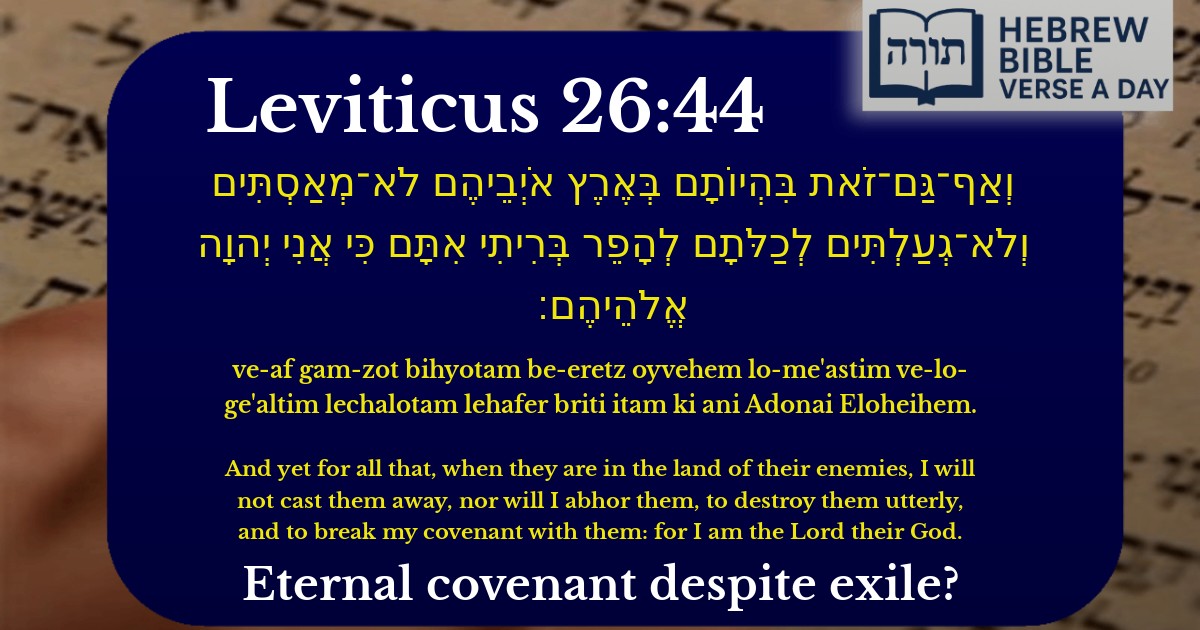Join Our Newsletter To Be Informed When New Videos Are Posted
Join the thousands of fellow Studends who rely on our videos to learn how to read the bible in Hebrew for free!
Hebrew Text
וְאַף־גַּם־זֹאת בִּהְיוֹתָם בְּאֶרֶץ אֹיְבֵיהֶם לֹא־מְאַסְתִּים וְלֹא־גְעַלְתִּים לְכַלֹּתָם לְהָפֵר בְּרִיתִי אִתָּם כִּי אֲנִי יְהוָה אֱלֹהֵיהֶם׃
English Translation
And yet for all that, when they are in the land of their enemies, I will not cast them away, nor will I abhor them, to destroy them utterly, and to break my covenant with them: for I am the Lord their God.
Transliteration
Ve-af gam-zot bihyotam be-eretz oyvehem lo-me'astim ve-lo-ge'altim lechalotam lehafer briti itam ki ani Adonai Eloheihem.
Hebrew Leining Text
וְאַף־גַּם־זֹ֠את בִּֽהְיוֹתָ֞ם בְּאֶ֣רֶץ אֹֽיְבֵיהֶ֗ם לֹֽא־מְאַסְתִּ֤ים וְלֹֽא־גְעַלְתִּים֙ לְכַלֹּתָ֔ם לְהָפֵ֥ר בְּרִיתִ֖י אִתָּ֑ם כִּ֛י אֲנִ֥י יְהֹוָ֖ה אֱלֹהֵיהֶֽם׃
וְאַף־גַּם־זֹ֠את בִּֽהְיוֹתָ֞ם בְּאֶ֣רֶץ אֹֽיְבֵיהֶ֗ם לֹֽא־מְאַסְתִּ֤ים וְלֹֽא־גְעַלְתִּים֙ לְכַלֹּתָ֔ם לְהָפֵ֥ר בְּרִיתִ֖י אִתָּ֑ם כִּ֛י אֲנִ֥י יְהֹוָ֖ה אֱלֹהֵיהֶֽם׃
🎵 Listen to leining
Parasha Commentary
📚 Talmud Citations
This verse is quoted in the Talmud.
📖 Megillah 10b
The verse is cited in the context of discussing God's enduring covenant with Israel, emphasizing that even in exile, God does not abandon His people.
📖 Yoma 54b
The verse is referenced to illustrate the idea that God's presence remains with Israel even when they are in the land of their enemies.


Divine Fidelity Despite Exile
The verse (Vayikra 26:44) emphasizes Hashem's unwavering commitment to Bnei Yisrael even during their exile among hostile nations. Rashi explains that this assurance comes "even when they are in the land of their enemies" – demonstrating that Divine providence persists regardless of geographical or political circumstances. The double language of "לא מאסתים ולא געלתים" ("I will not cast them away nor abhor them") underscores the completeness of this promise.
Covenantal Assurance
Rambam (Hilchot Teshuvah 7:5) derives from this verse that the eternal nature of the covenant means the Jewish people will never be fully rejected, even when deserving severe punishment. The phrase "להפר בריתי אתם" ("to break My covenant with them") is interpreted by Sforno as affirming that the covenant is intrinsically linked to Hashem's identity as "ה' אלקיהם" ("Hashem their God") – an eternal relationship that transcends conditional circumstances.
Exilic Protection in Midrashic Thought
Theological Implications
The Talmud (Megillah 11a) connects this verse to the Purim narrative, showing how Divine providence operated covertly in exile. This reflects the Orthodox Jewish understanding of hester panim (the hidden Face), where Hashem's protection persists even when not overtly visible. The verse thus serves as a foundational text for the Jewish belief in ultimate redemption despite present exilic challenges.